
by admin | Apr 14, 2024 | Professional Development Webinars
Join me for an insightful webinar with Glaucio Pessoa, MBA, MSc, PE, PgMP, PMP, PMI-ACP, a seasoned Project and Program Management Professional from Alpharetta, Georgia, United States. This webinar is designed for senior project, program, and portfolio management professionals eager to explore business intelligence leadership.
This webinar will cover, among many, the below topics:
– The Role of Leadership in Cultivating a Data-Driven Organization: Perspectives on Success Factors
– The Necessity of Business Intelligence and Data Analytics for Effective Leadership
– Evolving Leadership Styles for a Competitive Edge in the Data-Driven Technological Landscape
– Identifying the Pitfalls: Why Some Data Analytics Initiatives Fail to Deliver Actionable Insights
– Strategies for Large Companies to Enhance Their Data and Analytics Capabilities
Attendees will benefit from Glaucio Pessoa’s experience and insights, and gain 1 PDU as an added benefit.
🔗 Reserve your spot now: https://bit.ly/3TSx8fj
Session Date & Time:
Friday, 03 May 2024
05:00 PM – 06:00 PM (PDT) / 06:00 PM – 07:00 PM (MDT) / 07:00 PM – 08:00 PM (CDT) / 08:00 PM – 09:00 PM (EDT) / 09:00 PM – 10:00 PM (BRT)
Saturday, 04 May 2024
08:00 AM – 09:00 AM (SGT/MYT) / 09:00 AM – 10:00 AM (KST/JST) / 09:30 AM – 10:30 AM (ACST) / 10:00 AM – 11:00 AM (AEST) / 12:00 PM – 01:00 PM (NZST)
🚀 Elevate Your Project Management Career:
– Book an obligation-free consultation session on Project management Career, training, and certifications: http://talktodharam.com
– Discover training offers and certification discounts: https://bit.ly/3jWVepD
– Stay updated with our Q&A series and certification success stories by subscribing to the vCare Project Management YouTube channel at https://bit.ly/2YF0wJl
– Follow Dharam podcasts and interviews with Project Management Experts on YouTube at https://bit.ly/2NDY8wd
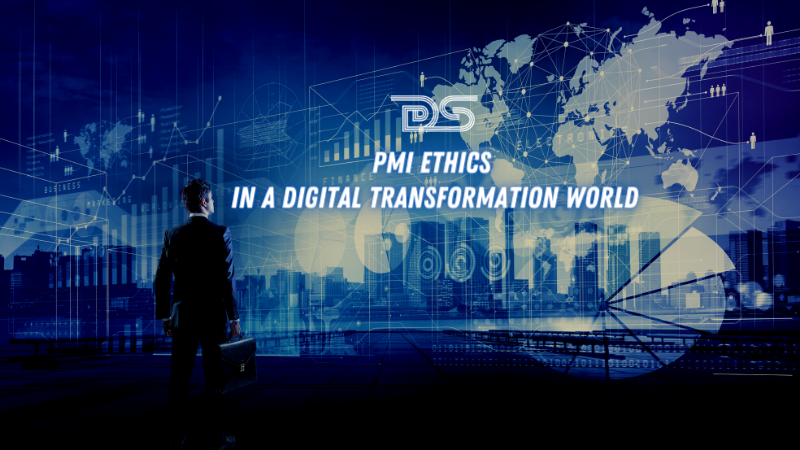
by DharamCW | Apr 20, 2021 | General
According to the PMI (Project Management Institute), “Ethics is about making the best possible decisions concerning people, resources and the environment. Ethical choices diminish risk, advance positive results, increase trust, determine long term success, and build reputations. Leadership is dependent on ethical choices”. Ethics represent a crucial differentiator in a highly competitive market where reputation and values are highly appreciated among the Project Management Professionals.
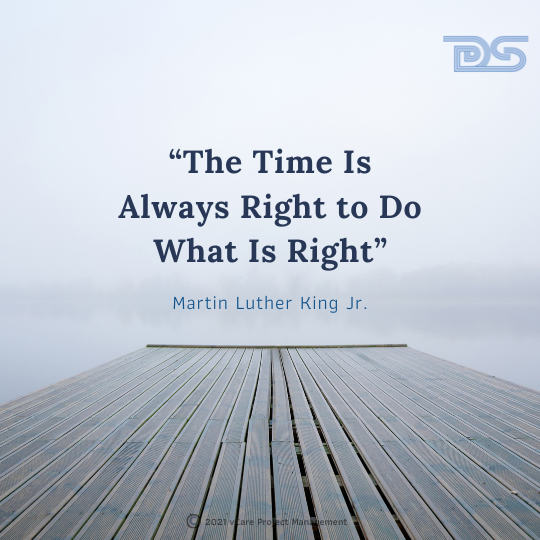
The Time Is Always Right to Do What Is Right
Martin Luther King Jr. said, “The Time Is Always Right to Do What Is Right”. As project managers/program managers or portfolio managers, we must make critical decisions daily. Though in the evolving digital transformation world, many decisions might go unnoticed, few do get noticed, as critical ones. These decisions have a profound impact on people, resources, and the environment. Some decisions might have led to conflicts, dilemma, or the creation of new risks.
What is Ethics, and what is the Role of PMI?
Ethics is the branch of knowledge that deals with moral principles. It involves steps, including systematizing, defending, and recommending concepts of right and wrong behaviours.
Regarding ethics at PMI, in the year 1981, the PMI team formed the PMI Board of Directors on Ethics, Standards, and Accreditation. The current PMI ethics document outlines the essentials of ethics based on Vision, Responsibility, Respect, Fairness, and Honesty. PMI expects its members to adhere to these codes of ethics to uphold its values.
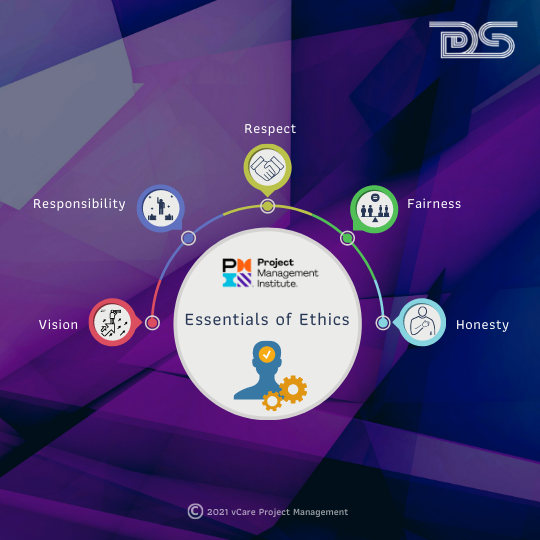
Essentials of Ethics
When the whole world is fighting the COVID-19 situation, and demand for digital transformation projects is at an all-time high, PMI professionals need not ask for a better time to establish high ethical standards. Let’s understand the key challenges a PMI trained professional faces in the current digital transformation world.
Digital Transformation
Digital transformation is the process of using digital technologies to create new — or modify existing — business processes, culture, and customer experiences to meet changing business and market requirements.
There are four types of digital transformation: business process, business model, domain, and cultural/organizational. We often see corporations focused solely on the process or organizational transformation.
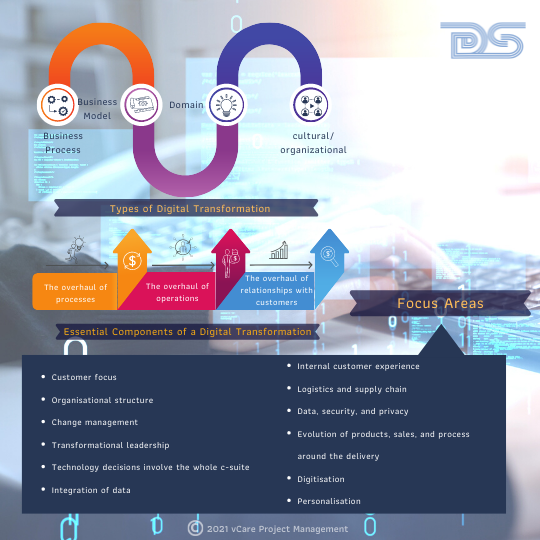
Digital Transformation
There are three essential components of a digital transformation:
- The overhaul of processes
- The overhaul of operations, and,
- The overhaul of relationships with customers.
The crucial elements that every digital transformation program needs to focus on are,
- Customer focus
- Organisational structure
- Change management
- Transformational leadership
- Technology decisions involve the whole c-suite
- Integration of data
- Internal customer experience
- Logistics and supply chain
- Data, security, and privacy
- Evolution of products, sales, and process around the delivery
- Digitisation
- Personalisation
The key aspects of the digital transformation world could have a major impact on Ethics.
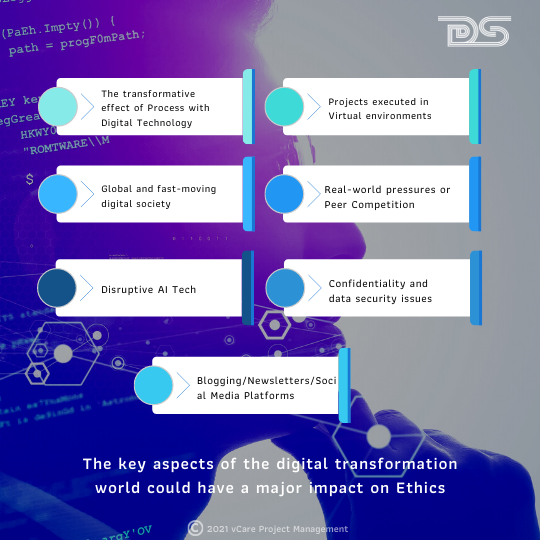
Major impact on Ethics
The transformative effect of Process with Digital Technology: Award-winning Author James Moor in 1985 mentions the transformative effect Digital Transformation could create. He cites the example transformation of manual votes to Electronic Voting Machines, which might benefit from speed and accuracy. On the contrary, it could impact security, vulnerability, transparency, and trustworthiness related issues.
Projects executed in Virtual environments: Today, the projects get implemented in remote places – Home/Office/Small Office combinations. People are working from remote, and it has become the new normal. People significantly use collaboration tools and in some occasions even communicate using social media, which could be manipulative.
Blogging/Newsletters/Social Media Platforms: Professionals tend to share the experience and insights reflecting upon the work ecosystem. Either sharing happens as an experience in a newsletter or a blog post, or it could be even a Twitter thread or a simple tweet reflecting a view. This act is typically done by those who tend to be expressive even within a professional organizational setup.
Global and fast-moving digital society: Communications spread very fast, and a diverse global culture leaves very little control. Digital technology, which is supposed to help leverage, could turn dangerous. The expectation for responsiveness sometimes leaves very little room for interpretation.
Real-world pressures or Peer Competition: Today’s real-world information sharing creates unwarranted peer pressure. This pressure might develop dilemmas and force individuals towards adverse decision-making. Sometimes, due to competitive peer pressures or financial pressures, even the employees’ health and safety concerns might get overseen.
Confidentiality and data security issues: Enhanced digital transformations across the globe have made data exchange easier. In the case of a data expose, it is vital to understand what is exchanged and what is the importance of the exchanged data. Lack of understanding of the data classification at appropriate levels could become risky when the proper accountability level could not be ascertained.
Disruptive AI Tech: Disruptive AI tech such as Chatbots, Speech Recognition Systems, etc., has made the way we think of data and decision making. Too much dependence or flawed inference might have an impact.
Ethics focus on PMIs Performance Domains & Digital Transformation
When a portfolio/program/project vision is established and defined, observable outcomes between the current state and future state as part of the digital transformation must be counted in. The key components that would impact the above said performance domains would be done with re-imagination, cultural change, and cross-functionality.
Digital transformation might have changed in a newer business model, new product focus, and a more contemporary way of working. Digital transformation is about getting the technology right and building necessary support and buy-in from the people managing resistance. Business processes need to be horizontally redesigned to enable collaboration across the teams.
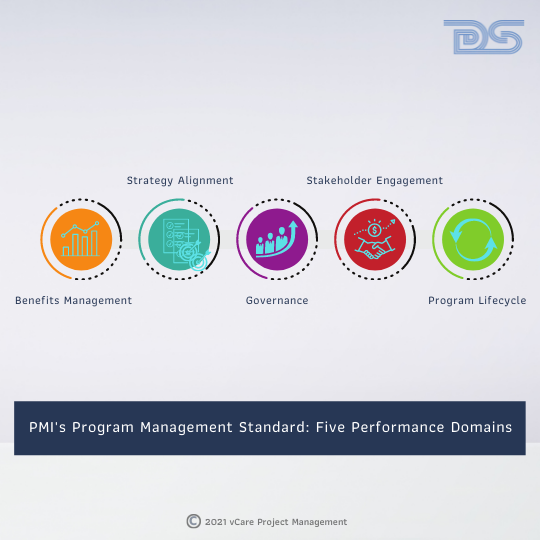
PMI’s Program Management Standard
PMI’s Program Management Standard defines five performance domains that can be integrated with ethics, giving a significant shift in ethics adoption, and may help in improving overall digital transformation initiatives. They are:
- Benefits Management: Benefits profile, which would be based on outcomes and measurement, has to have the ingredients of the ethics as well.
- Strategy Alignment: Strategic alignment to focus on the changing business environment and strategic targets on digital transformation must be governed through ethics.
- Governance: Governance focus and establishes control related to programs. Governance would bring discipline and ethics into the broader organizational structure.
- Stakeholder Engagement: Stakeholders to be kept well informed on the ethical aspects of getting involved whenever any changes in stakeholders.
- Program Lifecycle: Given a structure and suggested flow for a program, the ethics principle has to be adopted to address dilemmas related to circumstances of a business and initiative.
5As Decision-Making framework
PMI has recommended the 5A’ss decision-making framework outlines with Assessment-Alternatives-Analysis-Application-Action. The 5A’s assessment helps to collate all the facts about the ethical dilemma. It considers all your choices. Subsequently, decision candidates are identified and tested for their validity. Apply these principles to the candidates and make the final decision.
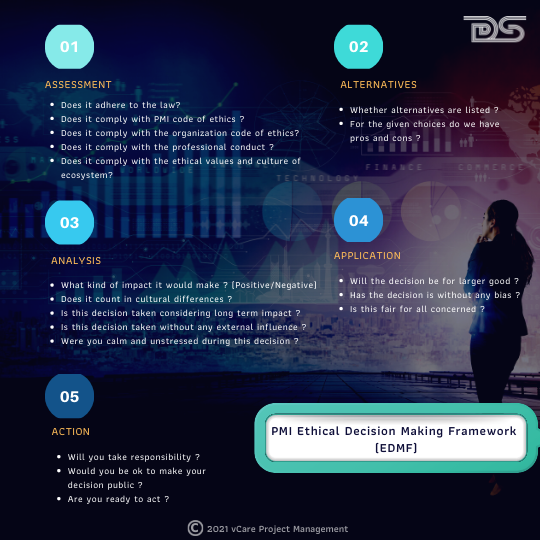
5As Decision-Making framework
The decision-makers, when they adopt the 5A decision-making framework, the following checklist:
Assessment
- Does it adhere to the law?
- Does it comply with PMI code of ethics ?
- Does it comply with the organization code of ethics?
- Does it comply with the professional conduct ?
- Does it comply with the ethical values and culture of ecosystem?
Alternatives
- Whether alternatives are listed ?
- For the given choices do we have pros and cons ?
Analysis
- What kind of impact it would make ? (Positive/Negative)
- Does it count in cultural differences ?
- Is this decision taken considering long term impact ?
- Is this decision taken without any external influence ?
- Were you calm and unstressed during this decision ?
Application
- Will the decision be for larger good ?
- Has the decision is without any bias ?
- Is this fair for all concerned ?
Action
- Will you take responsibility ?
- Would you be ok to make your decision public ?
- Are you ready to act ?
Benefits:
When the portfolio managers and program managers adopt the above-said approach outlined in the PMI code of ethics, it provides the following benefits:
- Elevates the profession and raises future standards
- Increases the faith and trust among peers
- Imprints on individual moral mindsets and behaviors
- Improves business relationships across the board
- Promotes fair decision making
- Reduces project risks
- Reduces anxiety and stress and ultimately turnover in projects
Conclusion
Transparency and integrity must be the core values which has to be established by the professionals. The data must be used in responsible and ethical ways during the digital transformation initiative. Data collection has to be based on the ethics principle called “Informed Consent.” The actions cannot be intrusive, manipulative, or disrespectful to others.
Trust must be established among the individuals, groups, or organizations involved in the digital transformations. This trust can be created by establishing data provenance, traceability from the source to the user interface. Program managers or portfolio managers have to act without any bias and with a high level of integrity and impartiality. The same has to be established for the clients, suppliers, and subcontractors without any favoritism and giving them an unfair advantage.
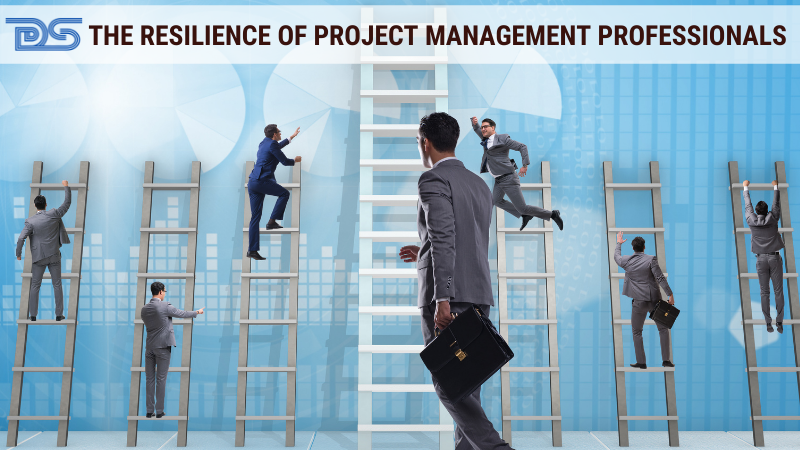
by DharamCW | Jun 26, 2020 | General
The impact of Covid-19
The key to surviving a global crisis is to display resilience by adapting to the ever-changing circumstances and giving up current practices in favour of those that are more tailor-made for the situation at hand. Given that Covid-19 has led to an unpredictable stagnation of growth, we are now faced with what is known in project management terms as the “unknown unknown”, which are risks that come from completely unexpected situations. We are witnessing this in the form of a disease outbreak that has upset all of our lives.

Resilience of Project Management Professionals
Entire business pyramid collapses have left organizations with the question of whether or not to change their entire mode of operations. Naturally, the answer is to adopt any means necessary to ensure that they continue to generate value for their beneficiaries. With a PgMP® certification, program managers can add value to their organizations and truly make a meaningful difference in this aspect. There will always be a demand for qualified professionals in the market. A PgMP® certification allows its holders to stand apart from their peers.
PMP® and PgMP® certification – What is the difference?
PMP®: It is purely knowledge-based and theoretical, relying on test-taking to quantify a candidate’s ability in recollecting facts and data. There are over a million holders of this certification globally.
PgMP®: It is competency-based, and it requires the candidate to become acquainted with theoretical concepts and demonstrate their applications in a practical setting, akin to the real world. The candidate is subjected to a peer review where he must explain the thought process that led to his decision. Such rigorous scrutiny has kept the bar high and has helped produce some of the most competent program managers that the world has ever seen. There are only around 3100 holders of this certification.
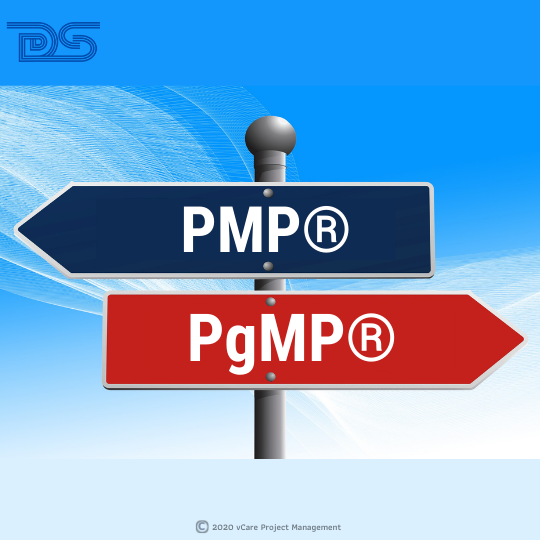
PMP® | PgMP®
In this environment of job insecurity and mass layoffs, such certifications are the most worthy qualifications that a professional can possess, to project his skill set and capabilities.
Value management: The generation of value is at the core of any organization. It may take on the form of project, program and portfolio management. Still, it is ultimately based on a single, underlying framework that binds them together, which is termed as “value management”. When program managers realize and embody this simple principle, an increase in revenue, market share and share value is bound to follow.
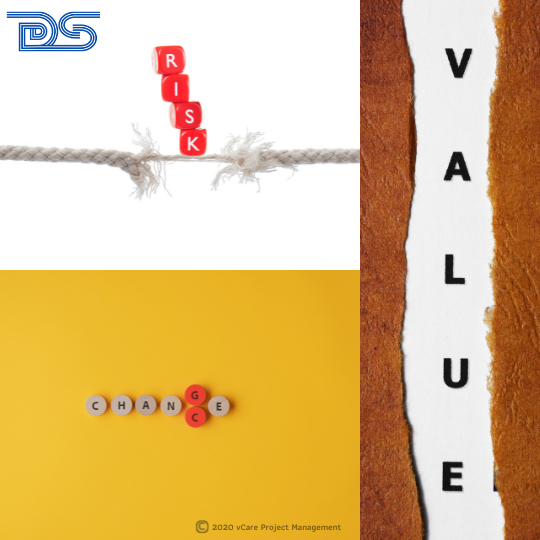
Value | Change | Risk
Change management is the ability of a manager to respond to disruptions, and it is the key to survival. But even when things change, some things will hold true at all times; one of which is the importance of the bond between organizations and their stakeholders. In times of adversity, program managers must display resilience and instil confidence in not just their organizations or their clients, but also their community at large.
Risk management: According to the PMI-PMBOK guidelines, risk is a subset of threats and opportunities. Where one sees a threat, another senses a chance, and by wreaking havoc on traditional establishments, the current economic climate has revealed gaps in the same that can be exploited by opportunistic individuals. The example that comes to the forefront is the health-care sector, and especially companies that manufacture masks, which have directly benefited from this disruption. However, this does not tarnish their reputation, as the global pandemic was neither orchestrated nor premeditated. Instead, they are merely providing an essential commodity that has gained tremendous value seemingly overnight. Hence, they are right to capitalize on this timely outcome.
So, while the path is clear for the health-care sector at the moment, it leaves professionals in other fields without clear guidance. Given the increased availability of free time, they ought to set their sights on an immediate short-term vision and leverage this half-year time frame to up-skill themselves, such as by acquiring PMI certifications, and the PgMP® in particular. This strategy would not only secure one’s immediate future but also pay dividends in the long term.
Staying ahead of the curve:
One of the ramifications of mass layoffs is the sudden arrival of experienced professionals in the job market pool, which inevitably fosters intense competition among job seekers. Driven by desperation, even veterans in the industry are willing to work for lower wages, which further snuffs out the ever-shrinking prospects of inexperienced, first-time jobseekers. As for those who have managed to keep their jobs, they still face the dilemma of maintaining relevancy within their organizations and justifying their pay. In both cases, an advanced certification such as the PgMP® will go a long way in proving one’s ability to create value, which is the hallmark of a competent manager. As stated by Michael Porter during the 2014 PMO conference, managers must always compete on value creation rather than a price reduction.
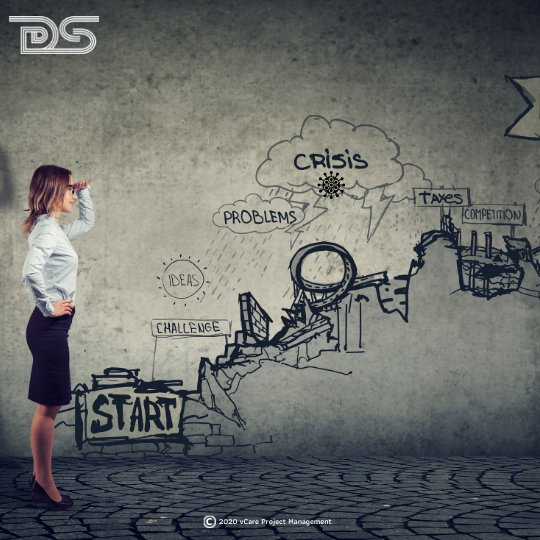
Staying ahead of the curve
Growth mindset vs predefined mindset
Growth mindset: A program manager who possesses this mindset is willing to adapt to changing situations by following the best course of action even it requires him to give up standard procedures.
Predefined mindset: A project manager who possesses this mindset sticks to the standard procedure regardless of the situation at hand.

Growth mindset vs predefined mindset
Despite the aura of despair in our current scenario, there is a case to be made for a bright future for those resilient managers who are willing to adopt a growth mindset and let go of a predefined one. And in terms of value proposition, an advanced certification can lay down the foundation for a sustainable future for one’s business as well as personal career growth.
In the below video, you can watch my interaction with Thomas Walenta and Olivier Lazar on the Resilience of Project Management Professionals amidst the COVID-19 crisis.
You can subscribe to my personal YouTube Channel using the link https://bit.ly/2NDY8wd. In this channel you can find videos of success stories, Q&A sessions and interactions with project-program-portfolio management experts. Subscribe to the channel and get notified on new videos.
For any questions related to Project Management training and certifications, you can book an obligation free 15 minutes session with me by visiting http://talktodharam.com/
View all our Online PgMP® Mentoring Programs
View all our Online PfMP® Mentoring Programs
PgMP4U LinkedIn Group: http://bit.ly/2SBPwIp
PfMP4U LinkedIn Group: http://bit.ly/31P7GKR
Email: dharam@vcareprojectmanagement.com

















Recent Comments